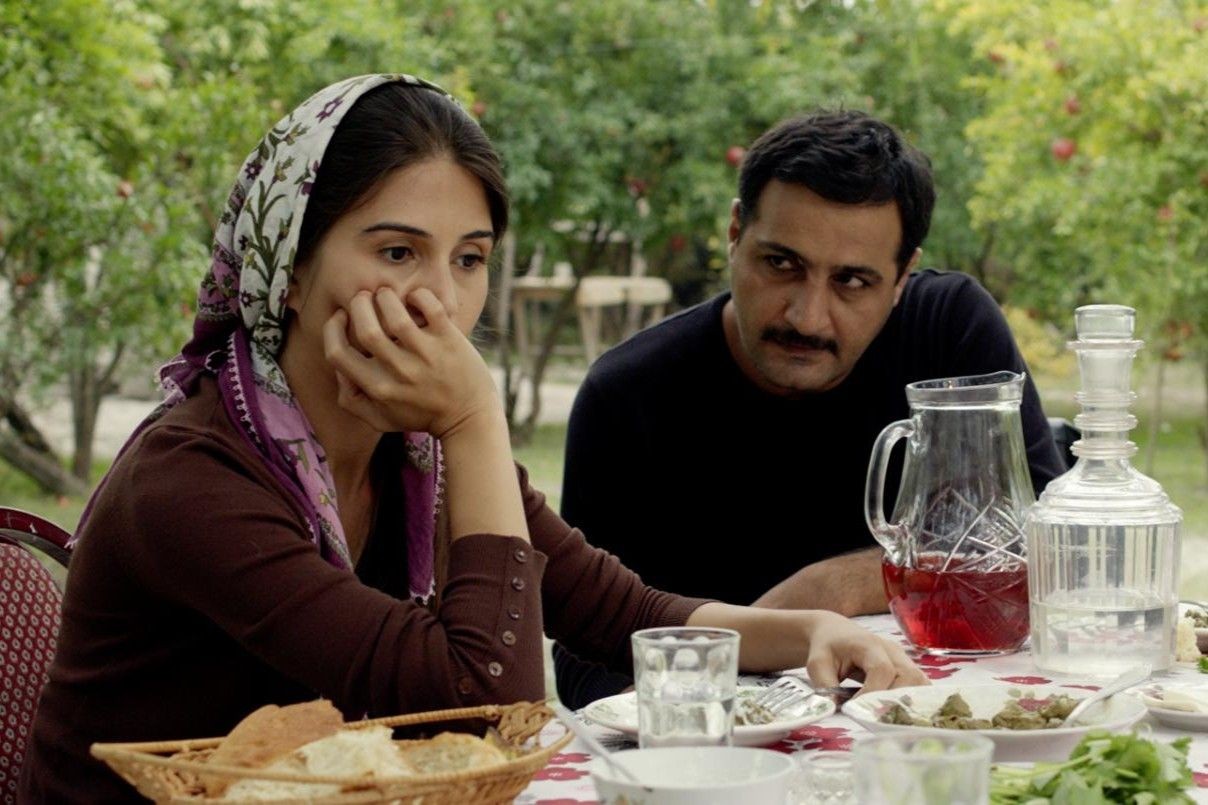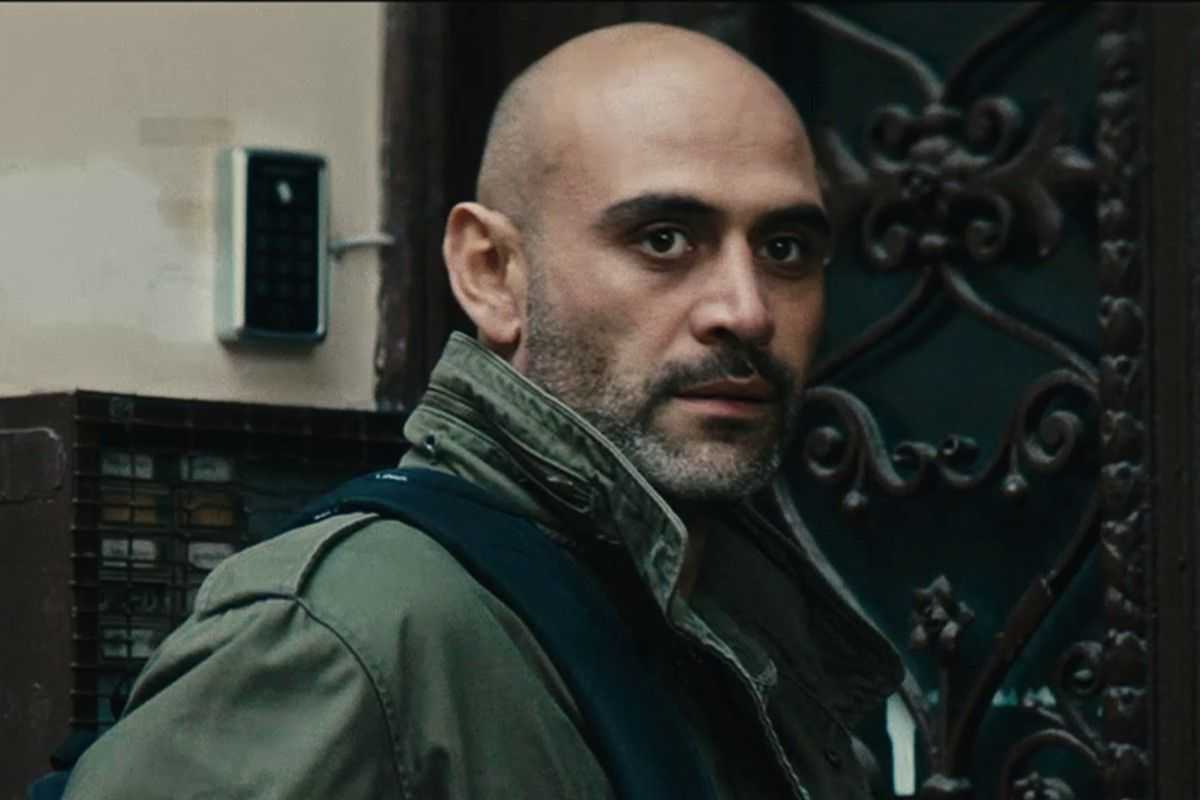Review | The Pomegranate Orchard — a restrained Azerbaijani retelling of Chekhov’s classic play

3.5/5 ★
This retelling of The Cherry Orchard is an understated and elegantly-paced domestic tragedy.
The Pomegranate Orchard (Nar bağı) is the second of Armenian-born Azerbaijani director Ilgar Najaf’s films. Released in 2017, it was subsequently selected as Azerbaijan’s entry for Best Foreign Language Film at the 90th Academy Awards. His first film, Buta (2011), was also selected, although neither were nominated.
As the title suggests, the film is loosely based on Anton Chekhov’s 1903 play The Cherry Orchard. Najaf borrowed the setting — an orchard in peril because of money troubles — along with Chekhov’s themes of grief, encroaching modernity, and intergenerational difference. They also share the narrative mechanism of a character returning home after a lengthy period away, but this is where the similarity ends. Unlike Chekhov’s play, there is absolutely no ambiguity as to its status as a comedy. Political dialogue is also largely absent, in contrast to The Cherry Orchard. Its cinematography is one of gentle, unfussy beauty — domestic scenes and landscapes cleverly framed and without background music, only the sounds of insects, birds, rain, and clinking glass.
The film opens with a shot that will recur with slight variations all throughout the film: a pomegranate tree, seen through an open window. The camera pans out slowly into a doctor’s office, where a young boy is performing an eye test. His mother Sara (Ilaha Hasanova) reveals that her son fell from a roof some weeks before. This, the doctor posits, is why his sight has grown weaker in one eye.
The doctor is reproachful in the face of the mother’s quiet guilt, and when she asks Sara if she has heard from her son’s father, we learn two things: that the father has abandoned the family, and that in this rural Azerbaijani village, everyone knows each other’s business. The disapproval of the doctor, as a kind of superego figure, shows us that Sara’s suffering is twofold: the straightforward emotional wound of abandonment, and a certain social alienation resulting from her status as a jilted woman.
Back at the farmstead, we are introduced to Shamil (Gurban Ismailov), the proprietor of the orchard and Sara’s father-in-law. The three characters exist in a harmonious domestic triangle, tending to the fruit trees and the slightly ramshackle house.
A threat to the orchard is immediately established with the visit of a character referred to as ‘Stupid Rasim’ (Rovshan Kerimdukht). Despite his apparent stupidity, Rasim (analogous to Chekhov’s Lopakhin, and the only character with a clear correspondence to The Cherry Orchard) is evidently of a worldly persuasion, intent on redeveloping the orchard into a housing complex. Shamil sends him packing, but whether it’s the invisible presence of Chekhov’s play, Shamil’s evident infirmity, or the approach of modernity in various synecdoches, the realisation of Razim’s threat feels inevitable.
The vast majority of the story unfolds within the family home and in the orchard itself. Family dramas often use the confines of the house to elicit claustrophobia, but in The Pomegranate Orchard the opposite is true. Tension arises precisely from the porosity of the home — a porosity which makes the house feel defenceless, immaterial, as if it could, and likely will, just blow away. The camera is always looking from within to without or vice versa, through perpetually open windows; the slates on the roof fall away (providing for a lovely framing shot of Shamil and his grandson). When a rainstorm begins, there is a heavy leak — the storm also announces the return of Gabil (Samimi Farhad), the prodigal son, after 12 years in Russia.
The family responds varyingly to the betrayal of Gabil’s abandonment. The next morning, there is no hot-blooded reunion, angry or joyful, between Gabil and Sara; we simply see Sara walking into the bedroom with shaking hands, glasses rattling on a tray, to perform in utter silence lymphatic cupping on Gabil’s broad hairless back. The family dynamic morphs gradually, but the deaths of Gabil’s mother and brother continue to weigh on the house.
Russia and its superior opportunities exert an active pull, operating almost like a fifth character. Gabil and his father have frequent disputes over the new-fangled ways Gabil acquired there. This is most often expressed with regards to money. When Gabil tells his father that he earned good money in Russia, Shamil replies, ‘I see no sack of gold.’ ‘Sacks of gold don’t look like they used to’, Gabil says, pulling a wallet out of his pocket and fanning out his credit cards. The old-world/new-world shift — arguably the film’s primary theme — is summed up by this contrasting attitude to money: the materiality of Shamil’s pomegranates and the sack of gold versus the proxy, the stand-in of Gabil’s credit cards.
Altogether, The Pomegranate Orchard is a well-paced, careful, elegant film. Particularly beautiful shots include one of Sara, seated, knocking the seeds out of pomegranates with red-stained fingers; a pomegranate tree growing out of a burnt-out car on the side of the road; and several shots on the veranda of the local teahouse: men drinking amber-coloured tea at small tables, trees with painted white trunks, the click of dominoes. The film’s biggest virtue is its emotional reticence. Rarely do our insights into the affective worlds of the characters come from dialogue, but the way the family members move around one another in the house is heavy with feeling. The Pomegranate Orchard won’t blow your mind or change your life, but its mood and its images will stay with you.
🗞️ Subscribe to OC Culture Dispatch
For our culturally curious readers: a free, biweekly selection of film, book, and music recommendations from the Caucasus. Our team offers a varied selection of hidden gems, cherished classics, and notable new releases from all over the region, included in our newsletter.









